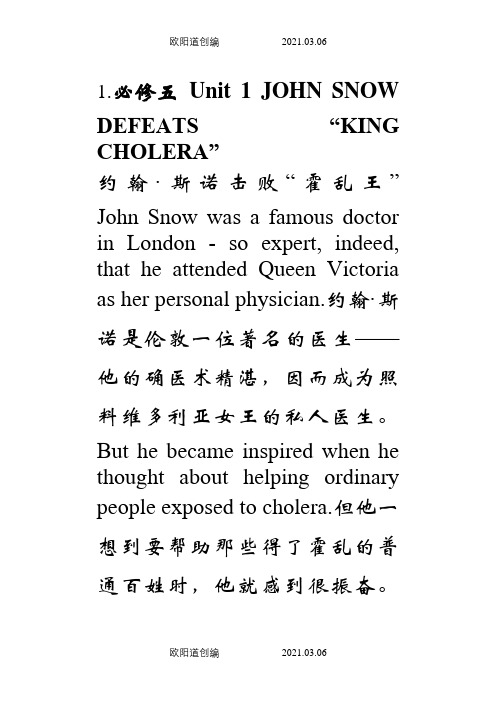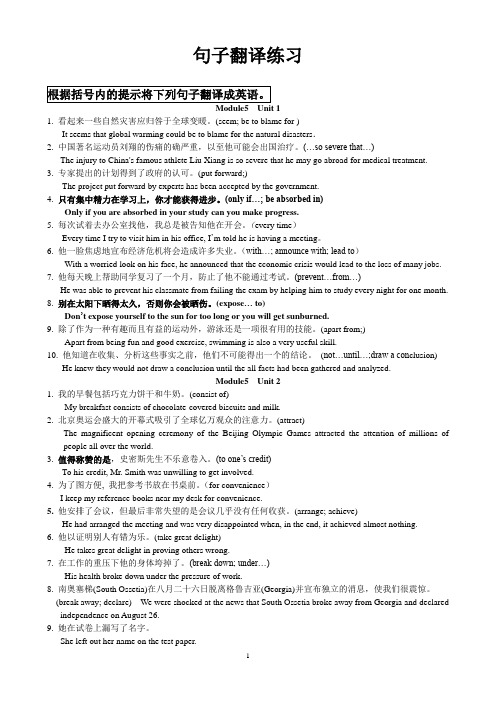精编人教版高中英语必修五佳句背诵、句子翻译汇总
- 格式:pdf
- 大小:172.17 KB
- 文档页数:7

高中英语必修5短语、重点句子Unit 1 Great scientistsI. Phrases1. put forward 提出2. draw a conclusion 得出结论3. be/get under control 在……控制下be/get out of control失去控制,不能操纵4. be absorbed in 专心5. be to blame 应该受责备(用主动形式表示被动)blame sb. for sth. 因某事责备某人6. in addition 也,另外,此外7. link...to... 将…和…连接或联系起来8. die of 因…而死亡(内因)die from 因…而死亡(外因)9. lead to 导致,通向10. make sense 有意义,说得通11. apart from 除…之外,此外12. contribute to 为…作贡献或捐款,导致,有助于13. be enthusiastic about 对…热情14. be curious about 对…好奇15. cure sb. of illness 治好某人…病16. point of view 态度,观点,看法17.(be)strict with sb. 对某人要求严格II. Sentences1. John Snow was a well-known doctor in London – so famous, indeed, that he attended Queen Victoria to ease the birth of her babies.约翰?斯诺曾经是伦敦一位着名的医生――他的确太负盛名了,所以维多利亚女皇生孩子时都是他去照料,帮助她顺利分娩。
2. But he became inspired when he thought about helping ordinary people exposed to cholera.但当他一想到要帮助患病的普通老百姓,特别是那些得了霍乱的患者时,他就感到很振奋。

1.必修五Unit 1 JOHN SNOW DEFEATS “KING CHOLERA”约翰·斯诺击败“霍乱王”John Snow was a famous doctor in London - so expert, indeed, that he attended Queen Victoria as her personal physician.约翰·斯诺是伦敦一位著名的医生——他的确医术精湛,因而成为照料维多利亚女王的私人医生。
But he became inspired when he thought about helping ordinary people exposed to cholera.但他一想到要帮助那些得了霍乱的普通百姓时,他就感到很振奋。
This was the deadly disease of its day.霍乱在当时是最致命的疾病,Neither its cause nor its cure was understood.人们既不知道它的病源,也不了解它的治疗方法。
So many thousands of terrified people died every time there was an outbreak.每次霍乱暴发时,就有大批惊恐的老百姓死去。
John Snow wanted to face the challenge and solve this problem.约翰·斯诺想面对这个挑战,解决这个问题。
He knew that cholera would never be controlled until its cause was found.他知道,在找到病源之前,霍乱疫情是无法控制的。
He became interested in two theories that possibly explained how cholera killed people.斯诺对霍乱致人死地的两种推测都很感兴趣。

1.必修五Unit 1 JOHN SNOW DEFEATS “KING CHOLERA”约翰·斯诺击败“霍乱王”John Snow was a famous doctor in London - so expert, indeed, that he attended Queen Victoria as her personal physician.约翰·斯诺是伦敦一位著名的医生——他的确医术精湛,因而成为照料维多利亚女王的私人医生。
But he became inspired when he thought about helping ordinary people exposed to cholera.但他一想到要帮助那些得了霍乱的普通百姓时,他就感到很振奋。
This was the deadly disease of its day.霍乱在当时是最致命的疾病,Neither its cause nor its curewas understood.人们既不知道它的病源,也不了解它的治疗方法。
So many thousands of terrified people died every time there was an outbreak.每次霍乱暴发时,就有大批惊恐的老百姓死去。
John Snow wanted to face the challenge and solve this problem.约翰·斯诺想面对这个挑战,解决这个问题。
He knew that cholera would never be controlled until its cause was found.他知道,在找到病源之前,霍乱疫情是无法控制的。
He became interested in two theories that possibly explained how cholera killed people.斯诺对霍乱致人死地的两种推测都很感兴趣。

句子翻译练习根据括号内的提示将下列句子翻译成英语。
Module5 Unit 11. 看起来一些自然灾害应归咎于全球变暖。
(seem; be to blame for )It seems that global warming could be to blame for the natural disasters.2. 中国著名运动员刘翔的伤痛的确严重,以至他可能会出国治疗。
(…so severe that…)The injury to China's famous athlete Liu Xiang is so severe that he may go abroad for medical treatment.3. 专家提出的计划得到了政府的认可。
(put forward;)The project put forward by experts has been accepted by the government.4. 只有集中精力在学习上,你才能获得进步。
(only if…; be absorbed in)Only if you are absorbed in your study can you make progress.5. 每次试着去办公室找他,我总是被告知他在开会。
(every time)Every time I try to visit him in his office, I’m told he is having a meeting。
6. 他一脸焦虑地宣布经济危机将会造成许多失业。
(with…; announce with; lead to)With a worried look on his face, he announced that the economic crisis would lead to the loss of many jobs.7. 他每天晚上帮助同学复习了一个月,防止了他不能通过考试。

xx必修 5 短语、重点句子Unit 1 Great scientistsI. Phrases1.put forward 提出2.draw a conclusion 得出3.be/get under control 在⋯⋯控制下be/get out of control 失去控制,不能操4.be absorbed in 心5.be to blame 受(用主形式表示被)blame sb. for sth. 因某事某人6.in addition 也,另外,此外7.link...to... 将⋯和⋯接或系起来8.die of 因⋯而死亡(内因)die from 因⋯而死亡(外因)9.lead to 致,通向10.make sense 有意,得通11.apart from 除⋯之外,此外12.contribute to ⋯作献或捐款,致,有助于13.be enthusiastic about ⋯ 情14.be curious about ⋯好奇15.cure sb. of illness 治好某人⋯病16. point of view 态度,观点,看法17.(be)strict with sb. 对某人要求严格II. Sentences1.John Snow was a well-known doctor in London–so famous, indeed, that he attended Queen Victoria to ease the birth of her babies.约翰 ?斯诺曾经是伦敦一位著名的医生――他的确太负盛名了,所以维多利亚女皇生孩子时都是他去照料,帮助她顺利分娩。
2.But he became inspired when he thought about helping ordinarypeople exposed to cholera.但当他一想到要帮助患病的普通老百姓,特别是那些得了霍乱的患者时,他就感到很振奋。

必修五Unit 1 JOHN SNOW DEFEATS “KING CHOLERA”约翰·xx击败“霍乱xx”John Snow was a famous doctor in London - so expert, indeed, that he attended Queen Victoria as her personal physician.约翰·xx是xx一位著名的医生——他的确医术精湛,因而成为照料xx女xx的私人医生。
But he became inspired when he thought about helping ordinary people exposed to cholera.但他一想到要帮助那些得了霍乱的普通百姓时,他就感到很振奋。
This was the deadly disease of its day.霍乱在当时是最致命的疾病,Neither its cause nor its cure was understood.人们既不知道它的病源,也不了解它的治疗方法。
So many thousands of terrified people died every time there was an outbreak.每次霍乱暴发时,就有大批惊恐的老百姓死去。
John Snow wanted to face the challenge and solve this problem.约翰·xx想面对这个挑战,解决这个问题。
He knew that cholera would never be controlled until its cause was found.他知道,在找到病源之前,霍乱疫情是无法控制的。
He became interested in two theories that possibly explained how cholera killed people.斯诺对霍乱致人死地的两种推测都很感兴趣。
高中英语必修 5 短语、重点句子Unit 1 Great scientistsI. Phrases1. put forward 提出2. draw a con clusi on 得出结论3. be/get under control 在??控制下be/get out of control 失去控制,不能操纵4. be absorbed in 专心5. be to blame 应该受责备(用主动形式表示被动)blame sb. for sth.因某事责备某人6. in addition 也,另外,此外7. link...to...将?和?连接或联系起来II. Sentences1. Joh n Snow was a we-known doctor in London - so famous, in deed, that heatte nded Quee n Victoria to easethe birth of her babies 纟勺翰?斯诺曾经是伦敦一位著名的医生――他的确太负盛名了,所以维多利亚女皇生孩子时都是他去照料,帮助她顺利分娩。
2. But he became inspired when he thought about helping ordinary peopleexposed to cholera但当他一想到要帮助患病的普通老百姓,特别是那些得了霍乱的患者时,他就感到很振奋。
3. Neither its cause, nor its cure was un derstood 人们既不知道它的病源,也不了解它的治疗方法。
4. He knew it would never be controlled until its cause was found.1 / 11他知道,在找到病源之前,疫情是无法控制的。
5. He got interested in two theories explaining how cholera killed people. 霍乱之所以能致人于死,当时有两种看法,斯诺对这两种推测都很感兴趣。
高中英语必修5短语、重点句子Unit1Greatscientists提出得出结论getundercontrol在……控制下be/getoutofcontrol失去控制,不能操纵专心应该受责备用主动形式表示被动.因某事责备某人也,另外,此外...to...将…和…连接或联系起来因…而死亡内因diefrom因…而死亡外因导致,通向有意义,说得通除…之外,此外为…作贡献或捐款,导致,有助于对…热情对…好奇治好某人…病态度,观点,看法17.bestrictwithsb.对某人要求严格–sofamous,indeed,thatheattendedQueenVictoriatoeasethebirthofherbabies.约翰斯诺曾经是伦敦一位着名的医生――他的确太负盛名了,所以维多利亚女皇生孩子时都是他去照料,帮助她顺利分娩;.但当他一想到要帮助患病的普通老百姓,特别是那些得了霍乱的患者时,他就感到很振奋;,noritscurewasunderstood.人们既不知道它的病源,也不了解它的治疗方法;.他知道,在找到病源之前,疫情是无法控制的;.霍乱之所以能致人于死,当时有两种看法,斯诺对这两种推测都很感兴趣;.第二种看法是在吃饭的时候人们把这种病毒引入体内的;.他相信第二种说法,但是需要证明他是正确的;.看来要归罪于饮用水了;.约翰斯诺马上叫宽街上惊惶失措的老百姓拆掉水泵的把手,这样水泵就用不成了;.只有当你把太阳放在中心位置上,天空中其它行星的运动才能说得清楚;.看是只有他的新理论才能作出解释;’theoryisnowthebaseonwhichallourideasoftheuniversearebuilt.然而哥白尼的理论却是我们宇宙赖以建立的基础;Unit2TheUnitedKingdom由……组成…into…把……分成with…与……交战中from…挣托束缚;脱离legalsystem教育/立法制度badinfluenceon…对……有好/坏影响代替机器破坏,损坏;人身体出毛病;计划等受挫,失败出错省去;遗漏;不考虑about为…烦恼,困扰与某人讨论、争辩在你方便的时候withrelationto介关于……;和……相关在建设中: .对于用来描述这四个国家的词语,现在已经没有争辩的必要了;,thethreecountriesfoundthemselvesunitedpeacefullyinsteadofbywar.这三个国家惊奇地发现他们是和平地而没有通过战争联合起来了;.如果你想要使你的英国之旅不虚此行,你就必须把眼睛睁得大大的;,ZhangPingyuhadmadealistofthesitesshewantedtoseeinLondon.由于担心时间不够,张萍玉早就把她想在伦敦参观的地点列了一张单子; .刚建成的时候,它看起来真是金碧辉煌;.她最感兴趣的是那条经线;.只要你方便,随时都可以来;Unit3LifeintheFuturestrongimpressiononsb.给某人留下深刻印象.=.使人记住某事拿起/占用/接受/开始/从事/继续/选修speedup加速sweepup打扫/横扫/掠过useup用光comeup过来eatup吃光situp熬夜/坐正turnup出现/开大音/水量使某人回想起某事/提醒某人某事.提醒某人去做某事…提醒某人……of…结果遭受和…相似.一直做某事我们六人共六人for/through+the/alackof…由于……的缺乏belackingin缺乏品质/特点lackfor…缺乏……很快,立刻’sfeet从病痛或挫折中复原四面八方….看不见/看见Sb./outofsight看得见/看不见atfirstsight第一眼atthesightof…一看见……就……向A提供B+u/c许多…早于……compareAtoB把A与B作比较,把A比喻作B 出于健康原因变通,放宽究竟,到底在维修中…寻找帮忙,协助某人去做某事变软低声地说…对……乐观offthepower开/关电源向某人解释某事发出光/热等becaughtin…被困在……中要求某人做某事tobedone某物需要被应该…装备有……to…对……是必要的:.想想近一千年来有多少变化;你认为,未来的人将已克服了什么问题.空气似乎很稀薄,好像在混合的气体中剩下的氧气很少; =Whydon’tyousitdownandrest 为什么不坐下休息呢如果你是李强,你想去哪三个地方看看.这两种生物都不容易与之交谈;’ttellwhichiswhich.“丁波兹”有这么多的臂和腿,以致你无法区分哪些是手臂哪些是腿; .每个人都将得到陆上公寓两倍的个人空间;Unit4MakingtheNews对……感到好奇必将/将要/应该外出采访’sown独自,自己ofone’sown自己的……集中精力于……=beinteresting有趣的…with…随身携带…对……非常敏感依赖职业诀窍指控某人做某事.句中为了……理应当/被认为做过某事doingsth.盼望做某事./forsth.渴望做……/……完全搞错了说出全部真相在……前头outtodo/setaboutdoing着手做某事…onto…把……传递给…….与某人约会,预约润色语言风格getabsorbedin专心于,集中精力于依次,逐个地…against…为某人辩护记下./interviewsb.报道某事/采访某人…对……做调查从事最后byaccident故意地/偶然,意外地withsb.安排采访坚持而不是B解释.’sanalysis通过某人的分析:1.倒装NeverwillZYforgethisfirstassignmentattheofficeofChinaDaily.周阳永不会忘记他在中国日报报社当记者的首次任务;2.倒装Onlywhenyouhaveseenwhatheorshedoes,canyoucoverastorybyyourself.3.There’sNoneedforacamera没必要带相机;4.倒装NotonlyamIinterestedinphotography,butItookacourseatuniversity,soit’sactuallyofspecialinter esttome.对摄影我不仅感兴趣,在大学我还专修过摄影,因此,我的确对摄影特别感兴趣; 5.Thisishowthestorygoes.事情是这样的; 6.Haveyoueverhadacasewheresomebodyaccusedyourreportersofgettingthewrongendofthestick你是否有这样的情况:有人控告你手下的记者的报道完全失实Unit5Firstaidoffer/dofirstaidtosbperform/carryoutfirstaidonsb.对某人实施急救生病infected/burned受伤/感染/烧伤’slife挽救某人的生命触觉触电;电休克脱下;飞机起飞榨出;挤出反复;多次在适当的位置;适当’shandson找到赠予/给予某人某物一件珠宝dodamageto….使……受到危害/损害+n.pl.若干;许多…贴在…….上区别:,seconddegreeorthirddegreeburnsdependingonwhichlayersoftheskinsareburnt.根据皮肤烧伤的层次而有一度烧伤、二度烧伤和三度烧伤;.约翰正在房里学习,突然听到一声尖叫;她躺在前花园的地上,流血不止;’squickthinkingandthefirstaidskillshelearnedatschoolsavedMsSlade’slife.毫无疑问,是敏捷的思维和在学校学到的急救技术,使得斯莱德女士的生命得救了;.这说明了急救知识的确能发挥重要的作用;,keepthemhigherthantheheart,ifpossible.如果烧伤的部位在臂部或腿部,可能的话,就要把他们抬高到高于心脏的位置;。
人教版高中英语必修 5 重点词汇、短语、句型、语法大全人教版高中英语必修5重点、短、句型、法大全Unit1 Great scientists 【重点、短】1. put forward提出2.conclude 束,3. draw a conclusion得出4.defeat 打5.attend 照,理,出席6.expose to 使露7.cure 治愈,治8.challenge 挑9.suspect 疑,被疑者10.blame11.handle 柄,把手,理,掌控12.link 系,接13.link to 将⋯和⋯接14.announce 宣布15.contribute 捐献,献16. apart from 除了17. be strict with ⋯ 格18.make sense 讲的通,有意义19.spin 使旋转20.reject 拒绝,抛弃【重点句型】1. What do you know about infectious diseases? 你对传染性疾病了解多少?2. John Snow was a famous doctor in London indeed, that he attended Queen Victoria as – so expert, her personalphysician.约翰 ?斯诺是伦敦一位著名的医生——他的确医术精湛,因而成为维多利亚女王的私人大夫。
3.But he became inspired when he thought abouthelping ordinary people exposed to cholera.但当他一想到要帮助患了霍乱的普通老百姓,他就感到很振奋。
4. Neither its cause, nor its cure was understood.人们既不知道它的病源,也不了解它的治疗方法。
5. He knew that cholera would never be controlled until its cause was found.他知道,在找到病源之前,霍乱疫情是无法控制的。
高中英语必修5课文逐句翻译高中英语必修5课文逐句翻译高中英语必修是人民教育出版社出版的图书,由人民教育出版社课程教材研究所编制。
下面店铺带来的高中英语必修5课文逐句翻译。
高中英语必修5课文逐句翻译篇1THEME PARKS — FUN AND MORE THAN FUNWhich theme park would you like to visit? There are various kinds of theme parks, with a different park for almost everything: food, culture, science, cartoons, movies or history.Some parks are famous for having the biggest or longest roller coasters, others for showing the famous sights and sounds of a culture. Whichever and whatever you like, there is a theme park for you!The theme park you are probably most familiar with is Disneyland.It can be found in several parts of the world. It will bring you into a magical world and make your dreams come true, whether traveling through space, visiting a pirate ship or meeting your favourite fairy tale or Disney cartoon character.As you wander around the fantasy amusement park, you may see Snow White or Mickey Mouse in a parade or on the street.Of course Disneyland also has many exciting rides, from giant swinging ships to terrifying free-fall drops. With all these attractions, no wonder tourism is increasing wherever there is a Disneyland. If you want to have fun and more than fun, come to Disneyland!Dollywood, in the beautiful Smoky Mountains in the southeasternUSA, is one of the most unique theme parks in the world.Dollywood shows and celebrates America's traditional southeastern culture. Although Dollywood has rides, the park's main attraction is its culture. Famous country music groups perform there all year in indoor and outdoor theatres.People come from all over America to see carpenters and other craftsmen make wood, glass and iron objects in the old-fashioned way. Visit the candy shop to try the same kind of candy that American southerners made 150 years ago, or take a ride on the only steam- engine train still working in the southeast USA. You can even see beautiful bald eagles in the world's largest bald eagle preserve.And for those who like rides, Dollywood has one of the best old wooden roller coasters, Thunderhead. It is world-famous for having the most length in the smallest space. Come to Dollywood to have fun learning all about America's historical southeastern culture!If you want to experience the ancient days and great deeds of English knights and ladies, princes and queens, then England's Camelot Park is the place for you. Every area of the park is modelled after life in the days of King Arthur and the Knights of the Round Table. In one place, you can watch magic shows with Merlin the Wizard. If you want to see fighting with swords or on horseback, then the jousting area is a good place to visit.If you do well there, King Arthur may choose you to fight in the big jousting tournament. Do you like animals? Then visit the farm area, and learn how people in ancient England ran their farms and took care of their animals. To enter a world of fantasy about ancient England, come to Camelot Park!主题公园——是娱乐,又不仅仅是娱乐你想要参观哪一个主题公园呢?(世界上)有各种各样的主题公园,不同的公园有不同的主题,但几乎囊括了一切:食物、文化、科学、卡通、电影及历史。
精编人教版高中英语必修五佳句背诵、句子翻译汇总Unit1 Great Scientists佳句背诵:1.Neither its cause, nor its cure was understood.(L4)人们既不知道它的病源,也不了解它的治疗方法。
2.So many thousands of terrified people died every time there was an outbreak.(5)每次霍乱暴发时就有成千上万惊恐的人病死。
3. In two particular streets, the cholera outbreak was so severe that more than 500 people died in ten days.(17)在两条特定的街上霍乱流行得很严重,以至于10天内就有500多人死亡。
4. It seemed that the water was to blame.(25)看来水是罪魁祸首。
翻译句子:I find the UK divided into 3 zones.I find the Romans attracted by the historical architecture.I find the architecture beautiful.I find the collection in your hand.我发现北欧海盗不愿意。
I found the Vikings unwilling.我发现这个省份被省去了。
I find the province left out.我发现这是一次令人愉快的经历。
I find it an enjoyable experience.Unit2 The United Kingdom1)clarify this question 弄清这个问题2)Wales was linked to England .威尔士与英格兰联合起来3)refer to England4)The UK consists of four countries.5)break away to form its own government6)work together in some areas在某些方面共同合作7)for convenience8)It is divided into three zones.9)find most of the populaion settled in the south10)It is a pity that the industrial cities do not attract visitors.11)keep your eyes open 留心观察12)make your trip enjoyable and worthwhile13)to one’s credit 值得称赞的是;在…名下佳句背诵:1. England can be divided into three main areas.英国可以被分为三个主要的地区。
2. Now when people refer to England you find Wales included as well.现在当人们提到英国你会发现威尔士包括在内。
3. Happily this was accomplished without conflict.令人高兴的是这件事和平地实现了。
4. However, the southern part of Ireland was unwilling and broke away to form its own government.然而爱尔兰南部不愿意并且分离出去组建了自己的政府。
5. For convenience it is divided roughly into three zones.为方便起见它被大略地分成了三个地区。
6. It is a pity that the industrial cities built in the nineteenth century do not attract visitors.很遗憾,这座建于19世纪的工业城市对游客没有吸引力。
7. Only if you put the sun there did the movements of the other planet in the sky make sense.只有当你把太阳放在那个位置上,天空中其他行星的运动才能说得清楚。
翻译句子:1. 初见上白石你会发现它很漂亮。
(when first visited)2. 当地的人会给你安排食宿。
(arrange,accommodation )3. 人们以跳舞为乐。
(delight)4. 你会对这些户外活动如爬山、钓鱼感到很兴奋。
(thrill)5. 现在当人们提到糊吊你就会想到上白石。
(refer to,think of)6. 上白石因为它的面而出名。
(be known for)7. 你可以在你方便的时候来看看。
(convenience)参考答案:1. Shangbaishi is found beautiful when first visited.2. Local people will make arrangements for your accommodation.3. People have delight in square dancing.4. You will be thrilled at the outdoor activities, such as climbing and fishing.5. Now when people refer to Hu Diao(a kind of noodle made of starch) you will think of Shangbaishi.6. Shangbaishi is known for its noodles.7. You can visit Shangbaishi at your convenience.翻译-过去分词作宾补(1)我发现北欧海盗不愿意。
I find the Vikings unwilling.(2)我发现这个省份被省去了。
I find the province left out.(3)我发现这是一次令人愉快的经历。
I find it an enjoyable experience.(4)真遗憾你错过了这次机会。
It is a pity that you miss the opportunity.(5)你会使用传真机真是令人惊讶。
It is a surprise that you can use a fax.(6)教育体制如此完善真是令人惊讶。
It is a surprise that education institution is so complete.1.这个队由20名男孩子组成。
(consist of)__________________________________________________________________________________ 2.为了方便,他搬到了学校居住。
(convenience)__________________________________________________________________________________ 3.我知道这座房子在他的名下。
(to one’s credit)___________________________________________________________________________________ 4.这道难题让我感到迷惑。
(puzzle)___________________________________________________________________________________ 5.每年这个城市吸引成千上万的游客。
(attract)____________________________________________________________________________________ 1.This team consists of twenty boys.2.For convenience, he moved to his school to live.3.I know this house is to his credit.4.This difficult problem puzzled me.5.Every year this city attracts thousands of visitors/tourists.Unit 3 Life in the future-First Impressions佳句背诵:1.I still cannot believe that I am taking up this prize that I won last year.我仍然无法相信我现在正在接受去年赢得的这个奖励。
2.Worried about the journey, I was unsettled for the first few days.因为担心这次旅行,开始的几天都感到不踏实。
3.At first my new surroundings were difficult to tolerate.起初新的环境难以忍受。
4.I felt better in no time.我立刻感到好些了。
5.I lost sight of Wang Ping when we reached what looked like a large market.当我们到达一个像大市场的地方时我看不见王平了。
6.Exhausted, I slid into bed and fell fast asleep.感到很累;我很快溜上床睡着了。
7.It’s quick, efficient and environmentally friendly.它快捷有效而且环保。
8.We cannot blame the tools for the faults of the user.但是我们不能因为使用者的错误而责备仪器。
9.Nothing is wasted, and everything, even plastic bags, is recycled.什么都不浪费,所有的东西,哪怕是塑料袋也回收利用了。